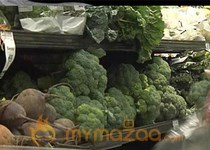Here's another reason to freak out over your teen or college-aged daughter's diet that seems to be based on ramen noodles and bubble tea: a new study finds that women who ate more fiber in their late teens and 20s had a much lower risk of breast cancer later.
A 20-year study of more than 90,000 women showed those who ate the most fiber while young had a 16 percent lower risk of breast cancer than those who ate the least and a 24 percent lower risk of having breast cancer before menopause, which tends to be a harder-to-treat form.
It might be because fiber tends to lower the hormone estrogen, which drives many types of breast cancer, the team reports in the journal Pediatrics.
"From many other studies we know that breast tissue is particularly influenced by carcinogens and anticarcinogens during childhood and adolescence," said Dr. Walter Willet, an expert on health and nutrition at Harvard's school of public health who led the study team.
"We now have evidence that what we feed our children during this period of life is also an important factor in future cancer risk."
Starting in 1991, women aged 27 to 44 at the time began answering questions about what they ate. In 1998 about half of them also filled out a questionnaire about what they ate in high school.
The women who ate the most fiber took in about 28 grams a day, compared to 15 grams a day or less for those who ate the least.
Twenty years later, the researchers looked to see who developed breast cancer and when.
The more fiber the women said they ate, the less likely they were to have had breast cancer. For each extra 10 grams of fiber they ate every day their breast cancer risk fell by 13 percent. Fiber from fruits and vegetables had the greatest effect, the team found.
"There is longstanding evidence that dietary fibers may reduce circulating estrogen levels," Kimberly Blackwell, a breast cancer specialist at the Duke Cancer Center, wrote in a commentary in Pediatrics.
Peas, beans and lentils are very good sources.
A cup of lentils or black beans has 15 grams.
A cup of raspberries delivers 8 grams of fiber.
A medium banana, potato or orange has 3 grams. A cup of broccoli has 5 grams; a cup of brown rice has 3 ½ grams while a cup of whole-wheat spaghetti has 6.3 grams.
Colorful fruits and vegetables also deliver antioxidants and other compounds that reduce the risk of cancer, heart disease, diabetes and other conditions.










